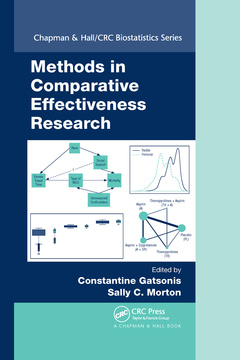Description
Methods in Comparative Effectiveness Research
Chapman & Hall/CRC Biostatistics Series
Language: English
Subjects for Methods in Comparative Effectiveness Research:
Keywords
Unmeasured Confounder; CER Study; propensity; Propensity Score; score; Marginal Structural Models; electronic; Randomization Assignment; health; NMA Model; record; Comparative Effectiveness Reviews; patient; Reduce Trial; centered; Interim Analysis; outcomes; IMS LifeLink; institute; Adaptive Randomization; inverse; EHR Data; Radial Artery Access; Inconsistency Factors; Platform Trial; EHR System; CD4 Count; Target Trial; 2SLS Estimator; Average Potential Outcome; Pragmatic Trials; Randomized Trials; Small DIC Value; Iv Assumption; CRT
Publication date: 12-2020
· 15.6x23.4 cm · Paperback
Publication date: 02-2017
· 15.6x23.4 cm · Hardback
Description
/li>Contents
/li>Biography
/li>
Comparative effectiveness research (CER) is the generation and synthesis of evidence that compares the benefits and harms of alternative methods to prevent, diagnose, treat, and monitor a clinical condition or to improve the delivery of care (IOM 2009). CER is conducted to develop evidence that will aid patients, clinicians, purchasers, and health policy makers in making informed decisions at both the individual and population levels. CER encompasses a very broad range of types of studies?experimental, observational, prospective, retrospective, and research synthesis.
This volume covers the main areas of quantitative methodology for the design and analysis of CER studies. The volume has four major sections?causal inference; clinical trials; research synthesis; and specialized topics. The audience includes CER methodologists, quantitative-trained researchers interested in CER, and graduate students in statistics, epidemiology, and health services and outcomes research. The book assumes a masters-level course in regression analysis and familiarity with clinical research.
Observational studies. Data sources and design considerations for observational studies in CER. Causal inference methods in CER. Clinical trials in CER. CER considerations for clinical trials: Choice of research questions, populations, study settings, and endpoints. Approaches to randomization: cluster randomization, use of EMR. Adaptive designs, Bayesian methods. Deriving evidence for population subsets, CER and personalized medicine. Systematic reviews. General: systematic reviews with study-level and individual patient-level data. General: Strength and quality of evidence data. Network meta-analysis. Systematic reviews of diagnostic accuracy. Modeling. Decision analysis. Micro simulation methods. Cost-effectiveness analysis. Value of Information analysis. CER for diagnostic tests. Prevention studies. Early detection and surveillance studies.
Constantine Gatsonis is Henry Ledyard Goddard University Professor, Chair of the Department of Biostatistics, and founding Director of the Center for Statistical Sciences at the Brown University School of Public Health. Dr. Gatsonis is a Fellow of the American Statistical Association (ASA) and received a Long-Term Excellence Award from the Health Policy Statistics Section of ASA.
Sally C. Morton is Dean of the College of Science at Virginia Tech. Previously, she was Professor and Chair of the Department of Biostatistics in the Graduate School of Public Health, and Director of the Comparative Effectiveness Research Center in the Health Policy Institute, at the University of Pittsburgh. Dr. Morton is a Fellow and past president of the ASA and received the association's Founders Award.




